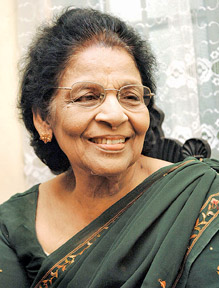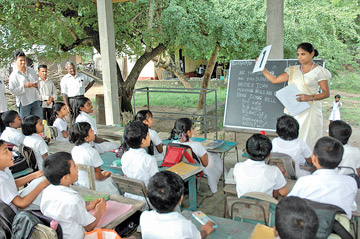|
Sex education requires reform:
Taboo no longer
Ridma Dissanayake
Recently crimes against infants have been on the rise. Desperate
mothers leaving their babies behind in CTB buses and at times going as
far as putting an end to the very life they helped to create. In spite
of years of sex education in Sri Lanka under aged women still get
pregnant with children they never intended to have. Hundreds of babies
dye at the hands of quacks, whose help these hapless young mothers seek
to avoid the humiliation of giving birth to an illegitimate child. Yet a
few more mothers die on the operating table.
|

Dr Thilokasundari Kariyawasam |
It is a fast moving world. Children are exposed to information
regarding age an earlier age, information they may not know how to deal
with. Where has Sri Lankan sex education gone wrong? Is it the notion
that anything to do with 'sex' is taboo?
Sex education involves human sexual anatomy, sexual reproduction,
sexual intercourse, reproductive health, emotional relationships,
reproductive rights and responsibilities, abstinence, contraception and
other aspects of human sexual behavior. Sex education is the process of
giving information, forming attitudes and beliefs about sex.
According to Education Psychologist, Dr Thilokasundari Kariyawasam
sex education is essential to Sri Lanka, which can bring about many
influential changes. "Sex education is about helping young people to
make informed choices about their behavior and feel confident and
competent about acting on these choices" explained Dr Kariyawasam.
The young generation has a right to sex education and it is widely
accepted. Sex education helps to protect them from abuse, exploitation,
unwanted or unplanned pregnancies and infections of sexually transmitted
diseases including HIV.
Young people get information about sex and sexuality from a wide
range of sources including each other, through the media including
advertising, television and magazines, as well as leaflets, books and
websites which are intended to be sources of information about sex and
sexuality. Some of this will be accurate and some not. Consequently sex
education has become a timely need.
Dr Kariyawasam pointed out that the young generation should have
information on the following topics:
|

Sex education helps to protect young people from abuse and exploitation |
* Sexual development and reproduction - the physical and emotional
changes associated with puberty and sexual reproduction, including
fertilization and conception, as well as sexually transmitted diseases,
including HIV.
* Contraception and birth control - contraceptives methods, how they
work, how to use them, how to decide what to use or not and how they are
obtained.
* Relationships - types of relationships, love and commitment,
marriage and partnership and laws related to sexual behavior and
relationships as well as the range of religious and cultural views on
sex and sexuality.
"In addition, young people should be provided with information about
abortion, sexuality and confidentiality, as well as about the sources of
advice and support that is available" opined Dr Kariyawasam.
She explained that sex education can take place in a variety of
settings. Different people have the opportunity and responsibility of
providing sex education for young people. Parents, caregivers, teachers,
school programs and public health campaigns are common methods for sex
education. School-based sex education is an effective way of enhancing
young people's knowledge, attitudes and behavior.
Sex education is a school subject in many Asian countries. But Sri
Lankan sex education still lacks planning. It has much to do with the
conservative notion that 'sex' should be a taboo subject. Most teachers
are still wary of talking about sex with young students, because they
are uncomfortable with the subjects or are afraid of encouraging
thoughts of sex in young people. According to Dr Kariyawasam, many
parents and children are embarrassed to talk about sex and sexuality,
hesitant to broach the subject. When they finally do it may be too late.
"The important thing is to maintain an open relationship with
children, allow them to ask questions." As Dr. Kariyawasam pointed out
mothers should play a vital role in this. Home is the ideal place for
sex education. Young people may be reluctant at first, but this does not
mean that they have nothing to talk about.
According to Dr Kariyawasam sex education should start early,
preferably before puberty, before they develop certain behavioral
patters.
However the precise age depends on physical, emotional and
intellectual development as well as the level of understanding of an
individual. Dr Kariyawasam said that giving young people basic
information at an early age provides the foundation on which more
complex knowledge is built up over time.
In many Asian societies, sex is taboo for public discussion, due to
social, cultural and religious factors. But in the future the tendency
will be to have the first sexual experiences earlier and earlier.
Consequently they require knowledge and correct guidance.
According to Dr Kariyawasam development in sex education in Sri Lanka
is a necessity. There is also a need to pay more attention to the needs
of specific groups of young people like young parents, lesbian, gay and
bisexuals, as well as those who may be out of reach from services and
schools, socially vulnerable, like young refugees and asylum-seekers,
young people in prisons and also those living on the street. |



